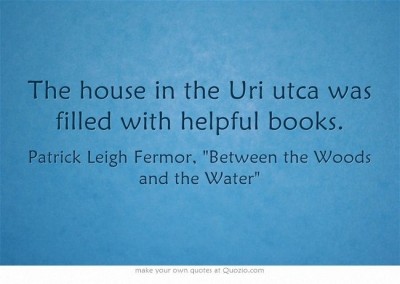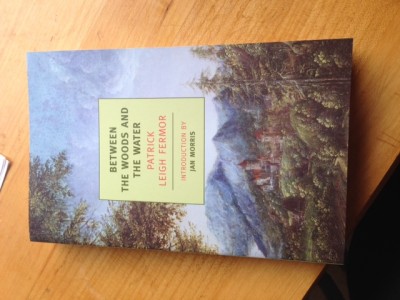Patrick Leigh Fermor on books





For today’s writers on writing segment, I thought I’d share a video about how I became a writer. Hint: it has something to do with a hound dog hatching from an egg.

![]() This week, Yuvi Zalkow interviewed Thaisa Frank for The Rumpus. They met at the bar of the Hotel Rex, where Frank, author most recently of Enchantment, talked about where stories come from, among other things. I’ve long admired Frank, beginning with her story collection A Brief History of Camouflage, have often taught her work in creative writing classes, and in recent years have been honored to get to know her.
This week, Yuvi Zalkow interviewed Thaisa Frank for The Rumpus. They met at the bar of the Hotel Rex, where Frank, author most recently of Enchantment, talked about where stories come from, among other things. I’ve long admired Frank, beginning with her story collection A Brief History of Camouflage, have often taught her work in creative writing classes, and in recent years have been honored to get to know her.
In the intro, Zalkow says that the interview itself felt a bit like being inside a Thaisa Frank story. If you’ve read her work, you’ll have a vague and disturbing sense of what that means. When stepping into a Thaisa Frank story, it’s almost impossible not to feel displaced, as if you’ve walked into a dark, empty bar and have brought none of the right equipment, not to mention the right frame of mind, to encounter whatever it is you’re about to encounter. When I first came across her stories in a San Francisco bookshop fifteen years ago, I felt as though I’d fallen through the rabbit hole. The stories in Enchantment, magical in every way, unexpected at every turn, seem to come from a different universe.
Read on for some of the highlights from the interview, which you’ll find in its entirety on The Rumpus.
On where stories come from:
I often feel there’s a triggering event that makes me want to start a story. There is a title often, but the title contains the stuff of the story. The title is like a packed piñata, even if it’s made of iron and I have to beat it and beat it for the stuff to come out.
On what happens when the story turns out not to be anything like the story you intended to write:
And it’s the failure of the intended story that usually guarantees, if not success, then the forward motion of the final story.
On surrealism:
Old-fashioned surrealism is where you take one or two extraordinary things and have them in a world that obeys all the laws of reality…I’m also very interested in classic surrealism, where you take one thing that really couldn’t happen —like how Kafka took a guy and turned him into a bug—but after that, everything proceeds pretty logically.
On what’s missing from the teaching of fiction
…one of the things we don’t have in teaching fiction is a true poetics of fiction—a way of talking about fiction without getting tangled up in the content.
Read the Rumpus interview with Thaisa Frank. Visit Thaisa Frank’s website. Visit Yuvi Zalkow’s website.
Writers: Submit your work to the Fiction Attic Press First Novel Contest.
The iconic short story writer and essayist Grace Paley died yesterday at her home in Vermont. I have long been an admirer of her work, and have been such a disciple that my students over the years have probably become bored with the refrain, “If you want to learn how to write dialogue, read Grace Paley!”
I first read Paley in 1993, while living alone in a miserable little duplex in Knoxville, TN. I’d just accepted a job as a copywriter at an ad agency. I remember being snowed in during my first scheduled week of work, reading Paley on a set of Salvation Army sofa cushions I’d arranged on the floor as a bed. The crazy neighbors were screaming at each other, the snow was coming down, and I was bundled up in scarf, hat, and layers of sweats because I couldn’t afford to run the steam heat. That’s where I met Paley, in Little Disturbances of Man. I was mesmerized. Reading Paley was what taught me to write short stories. More on Paley in coming days…